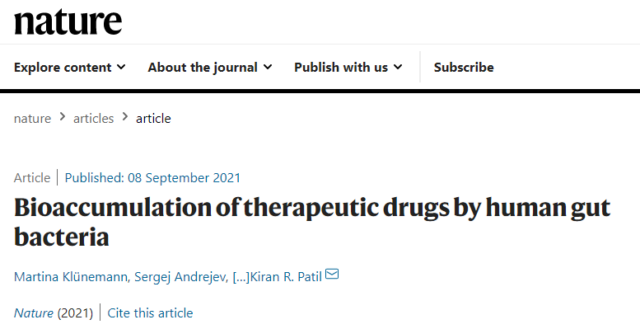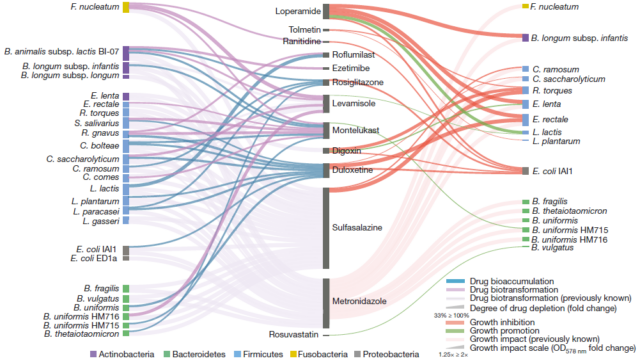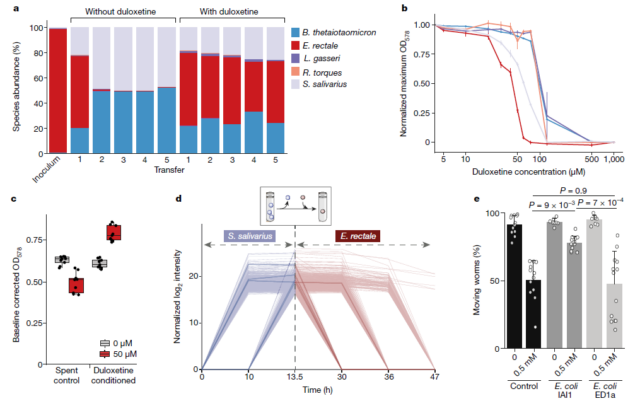Nature: All the medicines you take are eaten by the intestinal bacteria?
- Normal Liver Cells Found to Promote Cancer Metastasis to the Liver
- Nearly 80% Complete Remission: Breakthrough in ADC Anti-Tumor Treatment
- Vaccination Against Common Diseases May Prevent Dementia!
- New Alzheimer’s Disease (AD) Diagnosis and Staging Criteria
- Breakthrough in Alzheimer’s Disease: New Nasal Spray Halts Cognitive Decline by Targeting Toxic Protein
- Can the Tap Water at the Paris Olympics be Drunk Directly?
Nature: All the medicines you take are eaten by the intestinal bacteria? No wonder some diseases are so difficult to treat
- Should China be held legally responsible for the US’s $18 trillion COVID losses?
- CT Radiation Exposure Linked to Blood Cancer in Children and Adolescents
- FDA has mandated a top-level black box warning for all marketed CAR-T therapies
- Can people with high blood pressure eat peanuts?
- What is the difference between dopamine and dobutamine?
- How long can the patient live after heart stent surgery?
Nature: All the medicines you take are eaten by the intestinal bacteria? No wonder some diseases are so difficult to treat.
The study found that certain types of gut bacteria can accumulate and consume drugs, thereby altering the function of the bacteria and possibly reducing the effectiveness of the drugs. This may directly change the effectiveness of the drug, and indirectly change the function and composition of bacteria, and disrupt the balance of intestinal flora, which may be related to side effects.
The intestinal flora is an inseparable part of the human body. The trillions of bacteria living in our intestines play an important role in health. They affect people’s weight, digestion ability, resistance to infections and the risk of autoimmune diseases. It can even control the body’s response to cancer treatment drugs. We still know very little about the influence of intestinal flora on drugs.
On September 8, 2021, researchers from the Toxicology Group of the Medical Research Council (MRC) of the University of Cambridge and the German European Molecular Biology Laboratory (EMBL) published an article entitled “Bioaccumulation” in the top medical journal “Nature”. of therapeutic drugs by human gut bacteria” research paper.
The study found that certain types of gut bacteria can accumulate and consume drugs, thereby altering the function of the bacteria and possibly reducing the effectiveness of the drugs. This may directly change the effectiveness of the drug, and indirectly change the function and composition of bacteria, and disrupt the balance of intestinal flora, which may be related to side effects.

In this study, researchers cultivated 25 common gut bacteria and studied how they interact with 15 oral drugs. These drugs were chosen to represent a range of different types of common drugs.
The researchers conducted a total of 375 bacterial drug tests under the combination of 15 drugs and 25 bacteria.
The study found that there are 70 interactions between bacteria and the drug being studied, 29 of which are new discoveries.
Although early studies have shown that bacteria can chemically modify drugs, when the researchers further analyzed these interactions, they were surprised to find that out of these 29 new interactions, 17 belong to drug accumulation. The drugs are not modified. In the case of accumulation in bacteria.

Intestinal flora accumulation drugs
The researchers said that so far, biotransformation is considered to be the main way bacteria affect the availability of drugs. Surprisingly, most of the new interactions between bacteria and drugs we see are drugs that accumulate in bacteria.
Specifically, it has been found that some antidepressant drugs or drugs for treating diabetes will accumulate in bacteria. For montelukast (asthma medicine) and roflumilast (chronic obstructive pulmonary disease), it accumulates in some bacteria, but it will be modified by bacteria in others.
In order to understand in detail the molecular basis of bioaccumulation, the researchers carefully studied duloxetine, a widely used antidepressant. It was discovered that this drug not only accumulates in certain types of bacteria, but also changes the metabolites secreted by these bacteria, disrupting the balance of intestinal flora.

Duloxetine bioaccumulation changes flora composition and host response
Finally, the researchers used the worm model to find that bio-accumulating bacteria can absorb enough specific drug molecules to change the therapeutic effect of the drug. Compared with worms that grow in bacteria that do not accumulate duloxetine, the behavior of these worms changes after exposure to duloxetine.
The researchers emphasize that the research is still in its early stages. Although we are learning more about how gut bacteria interact with therapeutic drugs, the complexity of these interactions makes extensive clinical translation extremely challenging. And the unique composition of each person’s microbiome may mean that bacteria-drug interactions will vary from person to person.
In the next step, researchers will advance this basic molecular study and study how individual gut bacteria are linked to different individual responses to drugs such as antidepressants. It is hoped that by characterizing people’s responses based on the composition of the microbiome, personalized drug treatments can be promoted.
(source:internet, reference only)
Disclaimer of medicaltrend.org
Important Note: The information provided is for informational purposes only and should not be considered as medical advice.



